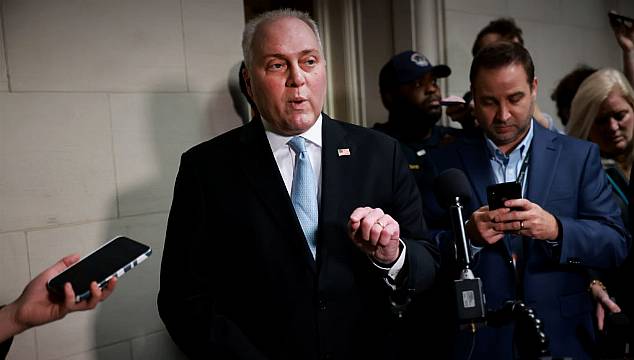Republicans who control the US House of Representatives on Wednesday nominated Steve Scalise to serve as speaker following last week's ouster of Kevin McCarthy, lawmakers said, though it was unclear whether he had enough support to win a vote of the full chamber.
Mr Scalise, who is currently No 2 on the Republican leadership ladder, must still win approval from the full House before he can claim the speaker's gavel. Republicans can afford only a handful of defections as they control the House by a narrow 221-212 majority and Democrats are not expected to vote for any Republican candidate.
Lawmakers said they expected a vote at 3pm ET (7pm GMT).
Republicans picked Mr Scalise over House Judiciary Committee chair Jim Jordan in a secret ballot vote behind closed doors. Mr Scalise, 58, has drawn the support of many veteran and establishment Republican lawmakers. The tally was 113 for Scalise and 99 for Mr Jordan, lawmakers said.
It remains to be seen whether Mr Jordan's backers will support Mr Scalise when his nomination comes up for a vote in the full House. Mr McCarthy in January had to endure 15 rounds of voting before clinching the speakership.
Before selecting Mr Scalise, Republicans rejected a proposal that would have required their nominee to secure 217 of their 221 votes.
That allowed Mr Scalise to win the nomination quickly, but left open the question of whether he would face a repeat of the battle in January for the role of speaker, which played out over four days.
Republican representative Kat Cammack predicted the floor vote would be a "bloodbath".
"What's going to happen at 3:00 is going to be a continuation of the chaos that has plagued the House," she said.
Republicans say they need to quickly resolve a leadership vacuum that has prevented the House from addressing the war in Israel, approving more aid to Ukraine and passing spending bills before current funding runs out on November 17th.
"It's really, really important that this Congress get back to work," Mr Scalise said.
Mr Scalise and Mr Jordan told Republicans at a closed-door forum on Tuesday night that they would each back the candidate chosen as nominee.
It took only eight Republicans to oust Mr McCarthy last week, a fact that could make leading the caucus a challenge for any new speaker.
While Mr McCarthy was the first speaker in US history to be removed in a formal vote, the last two Republicans to hold the job wound up leaving under pressure from party hardliners.
Americans have little confidence in Congress' ability to overcome its partisan differences - and the Republican infighting that led to Mr McCarthy's historic ouster on October 3rd. Some 64 per cent of respondents to a Reuters/Ipsos poll last week said they did not believe Washington politicians could put aside partisan disagreements for the good of the nation.







